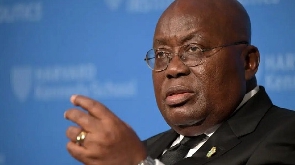 President of Ghana, Nana Addo Dankwa Akufo-Addo
President of Ghana, Nana Addo Dankwa Akufo-Addo
It's exactly six years since President Nana Addo Dankwa Akufo-Addo decried the high cost of food in the country.
According to him, Ghanaians pay too much for food, hence, the need for the cost to be brought down.
He attributed the high cost of food to the weak agriculture sector, promising to revamp the sector through the implementation of the Planting for Food and Jobs programme under his government.
“It is important we begin to bring down the cost of food in Ghana. We pay too much money for ordinary food in Ghana. You live here so you know the price of food here compared to Ghana,” he told Ghanaians living in Togo during his two-day official visit.
Read the full story originally published on May 4, 2017 by Laudbusiness.
President Nana Addo Dankwa AKufo-Addo has said Ghanaians pay too much for food hence his government’s resolve to make sure the Planting for Food and Jobs programme becomes a success.
“It is important we begin to bring down the cost of food in Ghana. We pay too much money for ordinary food in Ghana. You live here so you know the price of food here compared to Ghana.
This is because our agriculture is not working,” he told Ghanaians living in Togo on Wednesday 3 May where he is on a two-day official visit.
To bring the cost of food down, Mr Akufo-Addo explained that his government had introduced the Planting for Food and Jobs programme, which would not only ensure abundance of food supply but also create jobs.
He said: “Two weeks ago, I went to Brong Ahafo to launch what we call Planting for Food and Jobs. It’s a nationwide programme which involves 200,000 farmers. By the end of my four years we would have involved 2.5 million farmers. The farming population in Ghana is somewhere five million and systematically every year we will increase it.
“We are providing them with subsidised fertiliser, we are providing them with improved seedlings and we are also providing them with a group of people who have not been in the system for a long time: extension officers.
For the last five years, not a single person who has come from the colleges of agriculture has found employment in the public sector, so we have over 3000 young men trained to help our farmers sitting at home doing nothing. It does not help us.
So this year we are employing 1200 of them to help in the programme of Planting for Food and Jobs. Next year, we intend to get another 2000 and then we will have a system to be able to absorb those who come from the colleges so that they can provide our farmers that basic assistance in terms of what to do to improve their productivity. These are some of the key measures that we are taking.”
Watch the latest edition of BizTech and Biz Headlines below:
ESA/FNOQ